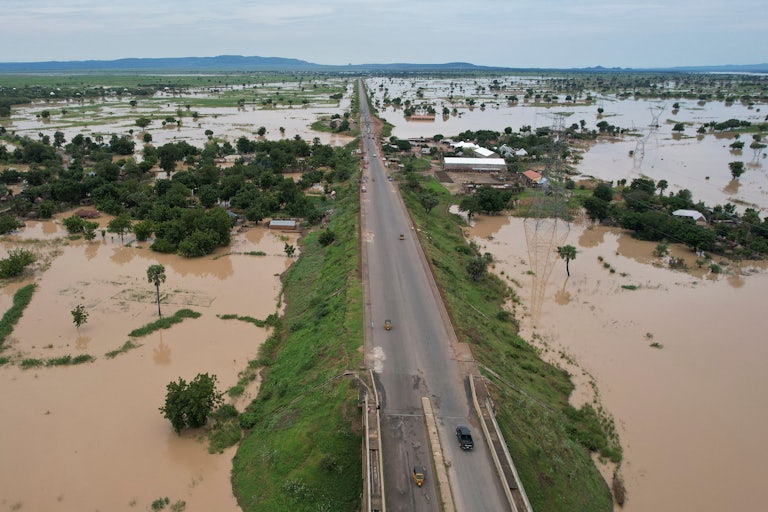Nigeria’s Floods Should Be Front-Page News
Imagine if three-quarters of U.S. states were flooded.

An estimated 1.4 million people have been displaced by recent flooding in Nigeria. Wrap your mind around that number for a second. For comparison: In the United States, in 2005, an estimated 1.5 million people in Gulf states evacuated ahead of Hurricane Katrina—considered the largest climate displacement event since the Dust Bowl—but many of those were able to return home after a few days, leaving about 600,000 displaced a month later. That was a monumental disaster. Yet Nigeria’s flooding may exceed those displacement numbers—and the story has barely broken through in the U.S. media.
The floods are affecting 27 of 36 states in Nigeria. (Can you even imagine if 75 percent of U.S. states were flooded at the same time?) Over 600 people have died so far, and “for some states,” Ruth Maclean reports for The New York Times this week, “more than a month of floods is likely still to come.” U.N. officials have confirmed the role of climate change in exacerbating the floods.
Perhaps the most horrifying thing about these floods is that Nigeria isn’t even considered one of the countries most vulnerable to climate change. TNR’s Kate Aronoff wrote about these countries in a piece published Wednesday. The group known as the V20 (for “Vulnerable 20 Group,” although it now includes 58 nations) recently floated the idea of halting payments on their sovereign debt, in part because servicing those debts is now keeping them from building up funds to prepare for and respond to climate disasters. That’s a measure born out of desperation, Kate writes.
“They’re all concerned about being the next Pakistan,” Kevin Gallagher, director of the Global Development Policy Center, told Kate. Flooding in Pakistan since June has killed more than 1,700 people. The damage is now projected to cost $40 billion, according to new estimates released this morning. That’s in addition to an “already crushing $100 billion external debt burden. Pakistan’s foreign exchange reserves stand at just $8.3 billion,” Kate noted.
Disturbingly, Kate reports, “more than 35 percent of V20 sovereign debt is owed to private creditors”—for-profit financial institutions like Blackrock or Vanguard. That means investors are actually making money on payments that are hindering poorer nations from being ready for the next deadly flood or drought or storm.
Think about this in the lead-up to U.N. climate talks in early November. In prior talks, rich nations like the U.S.—which bear a disproportionate amount of responsibility for global warming—have dragged their feet on substantial debt-relief measures, let alone funding for climate loss and damage.
The worst may be yet to come in Nigeria. As The New York Times reports about Pakistan, grieving families are unable to bury their dead loved ones: The cemeteries are underwater.
![]()
Good News
While Biden’s plan for a national Civilian Climate Corps hasn’t come to fruition, The Washington Post has a nice rundown of all the states that have decided to launch state-level efforts in the absence of federal action, from California’s early initiative reducing food waste (Never forget: Food waste represents 8 to 10 percent of global greenhouse gas emissions!) to Michigan’s announcement last month that it’s procured $1.3 million in federal funding for the state’s climate-focused iteration of AmeriCorps.
![]()
Bad News
The Mississippi River hit record-low levels on Monday, due to an ongoing drought. The drought is already wreaking havoc with shipments up and down the river, and if conditions worsen or persist—as they are expected to—the supply chain chaos will grow.
Stat of the Week

That’s the stunning figure that led the Alaska Department of Fish and Game to cancel snow crab season for the first time ever last week. Climate change is widely suspected to be contributing to the precipitous decline, as the crabs are very sensitive to water temperatures. (For further reading, don’t miss Audrey Gray’s 2019 report on how global warming is devastating New England’s fisheries.)
Elsewhere in the Ecosystem
Care About the Outdoors? You Need to Vote in the Midterms.
Many people right now are disenchanted with politics, Heather Hansman acknowledges. But “here’s the thing,” she writes: “If you care about the outdoors, not voting is a recipe for ever more frustration and disappointment.” And don’t forget the state board elections and ballot initiatives!
Know what’s even more snoozy than the word “midterm”? The phrase “state utility commission.” But the officials on those public utility commissions regulate electric, gas, telecommunications, water, and wastewater utilities. They have incredible power over how we generate energy and what kinds of energy we use, because they’re in charge of siting and permitting new facilities. Depending on the state, these individuals are either appointed by the governor (see above re: importance) or elected. This year, there are big state board elections in Montana, Arizona, and Georgia. [Craig] Auster [vice president of political affairs at the League of Conservation Voters] says that the makeup of those boards will be key for whether or not we create a clean energy future.
Auster also suggests keep[ing] an eye on the elections for the railroad commission in Texas, which oversees the state’s massive oil and gas industry, and the land commissioner in New Mexico.
Read Heather Hansman’s article on Outside.
This article first appeared in Apocalypse Soon, a weekly TNR newsletter authored by deputy editor Heather Souvaine Horn. Sign up here.
